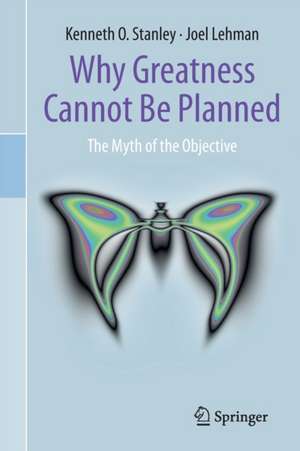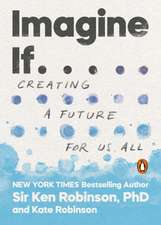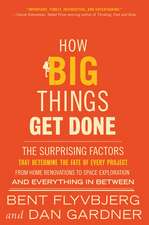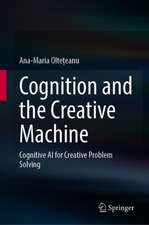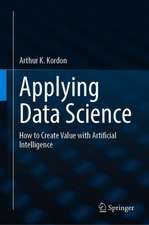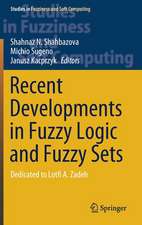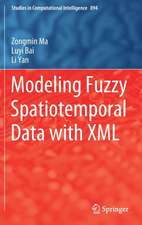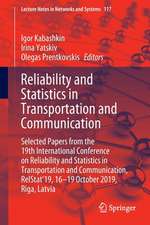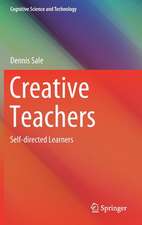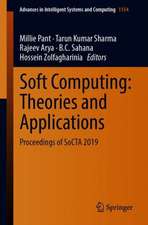Why Greatness Cannot Be Planned: The Myth of the Objective
Autor Kenneth O. Stanley, Joel Lehmanen Limba Engleză Paperback – 18 mai 2015
Controversial at its heart, yet refreshingly provocative, this book challenges readers to consider life without a destination and discovery without a compass.
Preț: 151.24 lei
Preț vechi: 189.05 lei
-20% Nou
Puncte Express: 227
Preț estimativ în valută:
28.94€ • 31.43$ • 24.31£
28.94€ • 31.43$ • 24.31£
Carte disponibilă
Livrare economică 01-15 aprilie
Preluare comenzi: 021 569.72.76
Specificații
ISBN-13: 9783319155234
ISBN-10: 3319155237
Pagini: 200
Ilustrații: IX, 141 p. 14 illus., 5 illus. in color.
Dimensiuni: 155 x 235 x 10 mm
Greutate: 0.23 kg
Ediția:2015
Editura: Springer International Publishing
Colecția Springer
Locul publicării:Cham, Switzerland
ISBN-10: 3319155237
Pagini: 200
Ilustrații: IX, 141 p. 14 illus., 5 illus. in color.
Dimensiuni: 155 x 235 x 10 mm
Greutate: 0.23 kg
Ediția:2015
Editura: Springer International Publishing
Colecția Springer
Locul publicării:Cham, Switzerland
Public țintă
Popular/generalCuprins
Questioning Objectives.-Victory for the Aimless.- The Art of Breeding Art.- The False Compass.- The Interesting and the Novel.- Long Live the Treasure Hunter.- Unshackling Education.- Unchaining Innovation.- Farewell to the Mirage.- Case Study 1: Reinterpreting Natural Evolution.- Case Study 2: Objectives and the Quest for AI.
Recenzii
“It is a very nicely written and enjoyable book, aimed at a general readership. It is also surely worthwhile reading for Artificial Intelligence (AI) researchers, particularly for those of us working in genetic programming. … I recommend Why Greatness Cannot be Planned. It is definitely unique within the evolutionary computation community.” (Leonardo Trujillo, Genetic Programming and Evolvable Machines, Vol. 16, 2015)
Notă biografică
Kenneth O. Stanley and coauthor Joel Lehman are both experienced artificial intelligence researchers whose scientific discoveries led to the insights in "Why Greatness Cannot Be Planned." Stanley, an associate professor at the University of Central Florida, has published over 80 peer-reviewed articles (10 of which have won best paper awards) and is regularly invited to speak at venues across the world. Lehman is currently a post-doctoral fellow at the University of Texas at Austin. In August 2015 he begins as an assistant professor at the IT University of Copenhagen.
Textul de pe ultima copertă
"What is your ultimate goal - your true objective - when you pick up a book? The authors of this one believe that there may be no objective at all involved, just a diffuse feeling that a book can change the way you look at the world. They may be right."
- Christos Papadimitriou, C. Lester Hogan Professor of Computer Science, University of California, Berkeley and Co-author of the New York Times Best Seller “Logicomix”
"One of the original aspirations of Artificial Intelligence researchers was to help all of us, as thinking beings, understand ourselves better. Stanley and Lehman are among the few who have managed to achieve this. In this book they not only shed light on a glaring bias in the way we approach the creation of intelligent machines, but have also identified this bias at work in many aspects of our society. It is not every day that a technical book so clearly reveals something new about how we live our own lives and how we might enrich them. I cherish such ararity, and I urge others to as well. "
- Josh Bongard, Associate Professor of Computer Science, University of Vermont
"The ideas in this book have revolutionized the field of evolving artificial intelligence. They also help explain why biological evolution, science, and human culture are creative, endlessly innovative processes. Stanley and Lehman's theories are helpful for anyone who wants to foster a culture of innovation in their organization and within their own mind."
- Jeff Clune, Director of the Evolving AI Lab and Assistant Professor of Computer Science, University of Wyoming "Objectives in our lives and careers, and the endeavor to achieve them, can sometimes cause stress and feelings of underachievement. But do we always need objectives? This book challenges common beliefs in our culture and society, revealing indisputable evidence that the biggest discoveries in the arts and sciences are not driven by objectives. The reading providesan uplifting new perspective on creativity, innovation, and happiness."
- Andrea Soltoggio, Lecturer in Computer Science, Loughborough University, UK
About the Authors
Kenneth O. Stanley and coauthor Joel Lehman are both experienced artificial intelligence researchers whose scientific discoveries led to the insights in “Why Greatness Cannot Be Planned.” Stanley, an associate professor at the University of Central Florida, has published over 80 peer-reviewed articles (10 of which have won best paper awards) and is regularly invited to speak at venues across the world. Lehman is currently a post-doctoral fellow at the University of Texas at Austin. In August 2015 he begins as an assistant professor at the IT University of Copenhagen.
- Christos Papadimitriou, C. Lester Hogan Professor of Computer Science, University of California, Berkeley and Co-author of the New York Times Best Seller “Logicomix”
"One of the original aspirations of Artificial Intelligence researchers was to help all of us, as thinking beings, understand ourselves better. Stanley and Lehman are among the few who have managed to achieve this. In this book they not only shed light on a glaring bias in the way we approach the creation of intelligent machines, but have also identified this bias at work in many aspects of our society. It is not every day that a technical book so clearly reveals something new about how we live our own lives and how we might enrich them. I cherish such ararity, and I urge others to as well. "
- Josh Bongard, Associate Professor of Computer Science, University of Vermont
"The ideas in this book have revolutionized the field of evolving artificial intelligence. They also help explain why biological evolution, science, and human culture are creative, endlessly innovative processes. Stanley and Lehman's theories are helpful for anyone who wants to foster a culture of innovation in their organization and within their own mind."
- Jeff Clune, Director of the Evolving AI Lab and Assistant Professor of Computer Science, University of Wyoming "Objectives in our lives and careers, and the endeavor to achieve them, can sometimes cause stress and feelings of underachievement. But do we always need objectives? This book challenges common beliefs in our culture and society, revealing indisputable evidence that the biggest discoveries in the arts and sciences are not driven by objectives. The reading providesan uplifting new perspective on creativity, innovation, and happiness."
- Andrea Soltoggio, Lecturer in Computer Science, Loughborough University, UK
About the Authors
Kenneth O. Stanley and coauthor Joel Lehman are both experienced artificial intelligence researchers whose scientific discoveries led to the insights in “Why Greatness Cannot Be Planned.” Stanley, an associate professor at the University of Central Florida, has published over 80 peer-reviewed articles (10 of which have won best paper awards) and is regularly invited to speak at venues across the world. Lehman is currently a post-doctoral fellow at the University of Texas at Austin. In August 2015 he begins as an assistant professor at the IT University of Copenhagen.
Caracteristici
Liberating message: Not all pursuits require an objective to justify them Questioning foundational assumptions: The way we typically think about achievement could be wrong Novel scientific argument: Evidence is provided from experiments with computers Social benefits: New approaches to perennial problems are suggested Accessible style: Written to appeal to novices and experts alike
